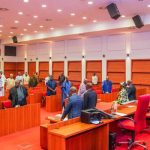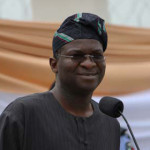Centre Tasks African States On Freedom Of Expression, Access To Online Information
Featured, Latest Headlines, News Around Africa Thursday, May 4th, 2023
(AFRICAN EXAMINER) – Centre for Human Rights, University of Pretoria in South Africa, has urged African States to facilitate the rights to freedom of expression and access to information online and offline.
The Centre said governments across the continent can achieve this by creating an environment that promotes the free flow of information with independent, pluralistic and diverse media.
The internationally recognised university-based institution which combines academic excellence and effective activism to advance human rights, particularly in Africa, gave the charge in a statement to mark this year’s World Press Freedom Day (WPFD) day.
The 2023 edition of the WPFD is commemorated under the theme: “Shaping a Future of Rights: Freedom of Expression as a Driver for all Other Human Rights”.
The Centre noted that creating an enabling environment facilitates the realisation of other human rights.
“To achieve this, States should adopt legislative, administrative, judicial and other measures to give effect to article 9 of the African Charter on Human and Peoples’ Rights as elaborated under the Model Law on Access to Information for Africa, the Guidelines on Access to Information and Elections in Africa, the Declaration of Principles on Freedom of Expression and Access to Information in Africa, and other international human rights laws and standards that promotes freedom of expression offline and online”, the statement said.
It also recalled that the 2019 Declaration of Principles on Freedom of Expression and Access to Information in Africa (the Declaration) which frames freedom of expression as a cross-cutting fundamental human right that is a cornerstone of democracy and a means of ensuring respect for other human rights (civil and political rights and socio-economic rights).
“As a basic and enabling right, freedom of expression can also potentially contribute to the much-needed socio-economic development and democratic transformation in Africa.
“While the press landscape in Africa continues to evolve with the adoption of internet-based technologies, the Centre notes with concern media sustainability challenges; the continued presence of censorship; inadequate whistleblower protection; the information disorder that manifests mostly in digital platforms; and arbitrary and unlawful surveillance and harassment of journalists and other media practitioners”, the statement added.
It further stated that this year, the African media fraternity is already reeling from the murder of Cameroonian journalist, Martinez Zogo, and the suspicious killing of Rwandan journalist, John Williams Ntwali. The Centre calls for justice for the arbitrary deaths of the two journalists who valiantly executed their professional duties.
“The failure to guarantee the safety of journalists and other media practitioners undermines the operations of the media and the free flow of information and ideas that are necessary for economic, political and social development”, it stressed.
The statement equally pointed out that Principle 37 of the Declaration places an obligation on States to recognise the importance of universal, equitable, affordable and meaningful access to the Internet for the realisation of freedom of expression, access to information and other human rights.
“It is important to note that access to the internet in Africa has significantly contributed to media diversity and plurality through the use of social media, which has improved access to information for wider audiences. For the media, the internet is a revolutionising tool that has brought advantages and challenges that have enabled it to adopt significant changes.
“However, although the media audience has increased with access to the internet, others are still excluded from the content that is disseminated through social media platforms such as TikTok, YouTube, Facebook and Twitter. This is because the continent is yet to achieve universal, equitable, affordable, and meaningful access to the internet as envisaged in the Declaration”, it further explained.
Through the Declaration, according to the statement, the African Commission on Human and Peoples’ Rights recognised the need to protect and promote the right to freedom of expression for everyone, including vulnerable and marginalised groups that face multiple forms of discrimination such as women, children, persons with disabilities, older persons, sexual and gender minorities, refugees, and internally displaced persons.
“Contrary to international human rights laws and standards, these groups continue to struggle for visibility in the media. On social media, for example, female politicians, journalists and human rights defenders are faced with the reality of confronting harassment and other forms of violence which make the space unfriendly.
“The concern for persons with disabilities revolves around the failure by the media to adopt inclusive measures that cater for the needs of different groups. Further, most rural communities are faced with obstacles such as infrastructural deficits that do not support internet connectivity, low mobile penetration, poor internet connectivity, and exorbitant cost of data”, the statement further posited.
It said while Africa enjoys the plurality of the media that has been enabled by the internet, there is however an unhealthy information ecosystem that has gained prominence, adding that access to credible and accurate information through the different forms of media is undermined by the dissemination of false information including disinformation and misinformation.
“However, what is concerning is that most laws on disinformation and government actions in response to disinformation are not in compliance with international human rights laws and standards. Internet shutdowns, network disruptions, and criminalisation of expression are some of the approaches that have been adopted by States.
“These infringe on the right of freedom of expression which is protected under international law and national constitutions. These infringements also undermine the rights to political and public participation that are anchored on the right to freedom of expression. The Centre notes with concern laws that have been adopted in Lesotho (Cybercrime Bill) and Mozambique (counter terrorism law) that criminalise publication of fake news and imposes harsh penalties”, it stressed.
Related Posts
Short URL: https://www.africanexaminer.com/?p=87647






















